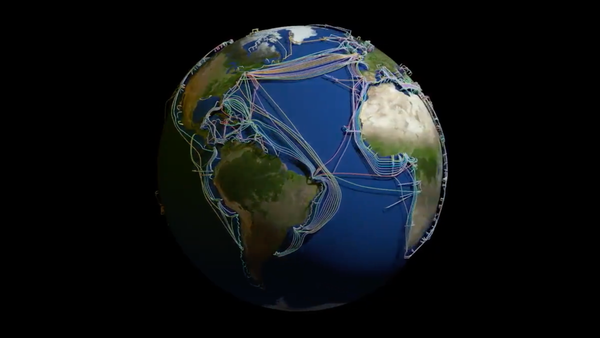
The United States is flirting with a TikTok ban again.
Yesterday the House of Representatives passed the Protecting Americans From Foreign Adversary Controlled Applications Act, a bill that sounds absolutely ridiculous and would allow the president to designate non-US social media apps as national security threats. If they’re hit with that label, they have six months to make sure they have no ties to a US adversary, which means a country like China or Iran. If they don’t follow through, they’d be banned from app stores and web hosting services, effectively cutting them off in the United States.
If the bill makes it through the Senate, is passed into law, and the president issues a designation to TikTok, that means its parent company ByteDance would have to sell it or risk having it being banned. A total ban still feels unlikely, but the United States flexing its muscle in this way should prompt a deeper examination of the ties that bind Silicon Valley and Washington, DC. For decades, the tech industry wanted to appear in opposition to government power, but the truth is that the global expansion of US tech was always a project of US geopolitical ambition.
A mutually beneficial arrangement
Imagine if some random country — let’s say Canada — passed a law tomorrow saying that Facebook or Google had to divest from US ownership or it would be blocked in the country within 180 days. After Facebook refused to abide by a local regulation to pay news publishers last year, some retaliation might be warranted. But putting that aside, how would the United States react? Its government would be furious — and it already is about lesser transgressions against its tech companies.
Google and Meta go to war with Canada
Take, for example, when Canada regulated streaming platforms last year so they’d have to show a bit more Canadian content to Canadian viewers. The US embassy was not happy about it. It also got angry when the Canadian government announced plans to move forward with a digital services tax targeting US tech companies, which it considered necessary because the United States has spent years stalling a global tax treaty aimed at making US tech multinationals pay more tax in the countries they operate, not just where they’re headquartered.
Even though the domestic discourse in the United States has shifted in recent years with more concern over monopolistic practices, the US government and Silicon Valley are still on the same page about the role US tech plays internationally. Back when US lawmakers were preparing to commercialize the internet, they were explicit that their intention was to use it to expand the country’s geopolitical influence. As internet “inventor” and then Senator Al Gore told the Senate in 1989, “the nation which most completely assimilates high-performance computing into its economy will very likely emerge as the dominant intellectual, economic, and technological force in the next century.” The United States wanted to win the race — and dominate everyone else in the process.
In The Promise of Access, Daniel Greene says the US government saw the internet as “an instrument of soft power,” especially in post-Soviet states that were emerging from communism. But it was also a great market opportunity. As internet access expanded globally, US companies got a head start (along with a massive influx of investment to accelerate their growth) as they planted their flags in international markets before foreign competitors could rise up to challenge them. And once they had the scale that came with global operations, it was easy to crush virtually any foreign upstart.
As Silicon Valley embarked on its global conquest, the United States supported it the entire way. Like in the Canadian examples, US diplomats are always ready to help their tech companies in international markets. Documents that leaked in 2022 showed how US ambassadors in France and the Netherlands had directly intervened to help Uber’s rollout in those countries, as it underpriced its service to push out local competitors and sought to steamroll local regulations. The United States also had problems with the European Union’s General Data Protection Regulation and is currently trying to negotiate the ability to exempt firms from an international treaty on the responsible use of AI.
This is a common tactic for the United States. Last year, Senator Elizabeth Warren called out how her own government negotiates protections for US tech companies in international trade deals. She cited how the US-Mexico-Canada Agreement placed limitations on those governments’ ability to regulate cross-border data flows and review source code, and how companies are lobbying for similar provisions to be inserted in the 14-country Indo-Pacific Economic Framework. In 2019, the New York Times reported they’d also been included in a deal with Japan and were being pushed by US diplomats in negotiations with the European Union, the United Kingdom, and members of the World Trade Organization.
Those specific rules designed to limit governments’ ability to regulate the tech sector came together in the negotiations over the Trans-Pacific Partnership under the Obama administration, and were continued under the Trump presidency. “Such rules open a Pandora’s box of issues for achieving public policy goals such as protecting privacy, competition, social and economic justice, and sustainable development,” explains lawyer Burcu Kilic in a study for the Heinrich Böll Stiftung.
China’s tech success
The United States’ diplomatic advocacy for the tech industry and the broader system of liberalized international trade it fought for in the latter half of the twentieth century have been immensely beneficial to Silicon Valley. Not only could US tech companies easily spread their products around the world without worrying too much about local regulation, but foreign governments were constrained whenever they tried to respond lest they run afoul of international trade rules. That meant that as Silicon Valley firms took over international markets, local governments had few tools to stop them or to promote local competitors in their place.
In Western discourses, China’s internet policies are often positioned solely as attempts to limit the freedoms of Chinese people — and that can be part of the motivation — but it’s a politically convenient explanation for Western governments that ignores the more important economic dimension of its protectionist approach. Chinese tech is the main competitor to Silicon Valley’s dominance today because China limited the ability of US tech to take over the Chinese market, similar to how Japan and South Korea protected their automotive and electronics industries in the decades after World War II. That gave domestic firms the time they needed to develop into rivals that could compete not just within China, but internationally as well. And that’s exactly why the United States is so focused not just on China’s rising power, but how its tech companies are cutting into the global market share of US tech giants.
As digital services and tech hardware made by Chinese companies displaces those made by US firms, it also affects the power and influence of the United States. The US government exaggerates the role of the Chinese Communist Party (CCP) in the operation of ByteDance and other Chinese tech companies, while downplaying the power it wields over its own tech firms. It’s as if they expect us to forget the Snowdon revelations about the vast surveillance apparatus developed by US intelligence agencies and the cooperation they received from US tech companies. Not to mention how US agencies buy their own citizens’ data from the same data brokers the Chinese government could use if it wanted to — all without TikTok being on people’s phones. Even Facebook whistleblower Frances Haugen spoke openly about the counterespionage work done by the company in the interest of US national security when she testified before Congress in 2021.
The United States used to be firmly opposed to any attempt to restrict the free flow of information technology because it benefited US companies that were dominating global markets. It’s been changing its tune in recent years not because its convictions have changed, but because the real guiding principles were always misunderstood. The global spread of the internet was framed by US lawmakers and tech capitalists as being synonymous with the spread of freedom and democracy — concepts the United States loves to wrap itself in — when it was really about geopolitics and economic power. Now that those goals are threatened, it’s happy to embrace bans to protect its interests, while pressuring its allies to back them and, by extension, accept the position of US tech firms within their economies.
But as US power slowly declines, it’s not guaranteed that will work. Western allies may be broadly on side with many of the restrictions the United States has been placing on the Chinese tech sector, but much of the rest of the world is not — and many of those countries are growing much faster than Europe and North America. Meanwhile, US attempts to thwart China’s technological rise don’t seem to be working as planned. Despite the restrictions on access to chip technology, China is pouring billions into the sector and already starting to see tangible results.
The US is protecting its power
When US lawmakers discuss their plans for a TikTok ban, they often talk about it as a national security threat — that it will allow China, through ByteDance, to get access to US data and information — but as I’ve already outlined, that’s not a strong argument. It overestimates China’s ability and desire to use ByteDance to that end, and ignores how the Chinese government has much easier ways to get that data without compromising one of its own tech giants.
There’s also a suggestion that lawmakers are trying to curb the spread of pro-Palestine sentiment as Israel’s genocidal campaign continues and other content critical of the United States. While I’m sure some of the gerontocrats that govern the country are incensed to hear those stories in the media or from lobbyists — and maybe even falsely believe the CCP is pulling the algorithmic strings — the primary reason behind this latest push is still to protect US power and defend its tech industry. Congress isn’t seriously pursuing a federal privacy law, restrictions on data brokers, or regulations that would cover all social media companies doing what it accuses TikTok of doing — it’s just singling out one (Chinese) company.
“This is not simply between Israel and Hamas. It’s much bigger than that.”
Just as the prospect of antitrust action against the titans of Silicon Valley started gaining traction in Washington, DC, the hysteria around China emerged as a key issue — and I don’t think that’s a coincidence. After finally coming in for some scrutiny, the tech industry had to find a bigger threat if it was going to protect itself. China was the perfect target. Facebook paid for an astroturf campaign to set the groundwork for the turn against TikTok to protect its control over social media, and the industry more broadly saw that if Chinese tech companies could be presented as a geopolitical problem, it would mean their monopolistic practices could be positioned as a necessary evil to counter that competition.
Silicon Valley has a long history of working with the US military, but the ties it has to the Pentagon today might still be surprising to someone watching the industry ten years ago. As the “New Cold War” rhetoric has gone into high gear, tech companies have been eager to get their own lucrative military contracts or government subsidies to develop new defense tech, find new ways to use AI to wage war, or help boost key industries like chip manufacturing. In short, positioning China as a geopolitical threat has been a boon for the tech industry, and any morals they once claimed to have are out the window as they cash in.
An end to US tech dominance
The global spread of the internet and dominance of the US tech industry that followed it also coincided with the United States’ several decades of global hegemony. After the fall of the Soviet Union, there was no other country that could challenge US power and it took full advantage by increasing its economic influence and, let’s be honest, launching a ton of unnecessary wars with disastrous consequences we’re still living with today. Now, as we transition toward a more multipolar world with other countries carving out regional spheres of influence, it’s not surprising that the “open” internet — meaning a US-dominated internet — is facing serious challenges.
The digital revolution has failed
Maybe you’re an American and you think the TikTok ban makes sense. Sure, US tech companies can track virtually everything you (and people in many countries outside the US) do, will hand that data over to the government, and even sell it to a ton of data brokers — but at least they’re US companies. Chinese ones shouldn’t be allowed to do the same thing, at least to US residents. That line of thinking makes no sense to me, but I can see how people only thinking of their own narrow national interests can believe it.
But why should a Canadian, a European, a Brazilian, a South Korean, or people from any number of other countries outside the United States defend that reality or find it in any way acceptable? When previous forms of media like radio, film, or television and communications technologies like the telephone rolled out, countries often placed rules on foreign ownership and content distribution, but with the internet little of that was allowed. Countries were expected to accept US dominance of the new medium, yet now we see what happens when those US firms start to face real competition at home: the US government does exactly what it long said no one else was allowed to do and protects its domestic industry.
Whatever happens with the TikTok ban, it’s time to reconsider the myths that have been built up about the internet and digital technology that were designed to serve the interests of US tech companies. China is in the crosshairs today because it’s the only country that’s developed a domestic tech industry that can really give Silicon Valley a run for its money. Should the rest of the world, or even just Western countries, really be expected to accept the dominance of Facebook, Amazon, and Google in perpetuity? Instead of defending US tech companies from Chinese competition, we must work toward a vision of an internet (and a world) that rejects the dominance of either.










Member discussion